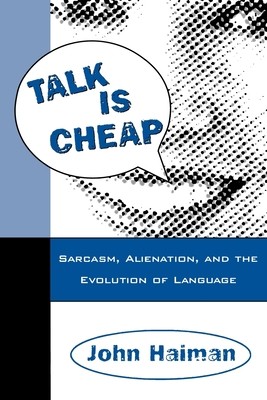
- We will send in 10–14 business days.
- Author: John Haiman
- Publisher: Oxford University Press, USA
- ISBN-10: 0195115252
- ISBN-13: 9780195115253
- Format: 15.5 x 23.3 x 1.9 cm, minkšti viršeliai
- Language: English
- SAVE -10% with code: EXTRA
Reviews
Description
Putting aside questions of truth and falsehood, the old "talk is cheap" maxim carries as much weight as ever. Indeed, perhaps more. For one need not be an expert in irony or sarcasm to realize that people don't necessarily mean what they say. Phrases such as "Yeah, right" and "I couldn't care less" are so much a part of the way we speak--and the way we live--that we are more likely to notice when they are absent (for example, Forrest Gump). From our everyday dialogues and conversations ("Thanks a lot!") to the screenplays of our popular films (Pulp Fiction and Fargo), what is said is frequently very different from what is meant.
Talk is Cheap begins with this telling observation and proceeds to argue that such "unplain speaking" is fundamentally embedded in the way we now talk. Author John Haiman traces this sea-change in our use of language to the emergence of a postmodern "divided self" who is hyper-conscious that what he or she is saying has been said before; "cheap talk" thus allows us to distance ourselves from a social role with which we are uncomfortable. Haiman goes on to examine the full range of these pervasive distancing mechanisms, from clichés and quotation marks to camp and parody. Also, and importantly, this text highlights several new ways in which the English language is evolving (and has evolved) in response to our postmodern world view. In other words, this study shows us how what we are saying is gradually separating itself from how we say it. As provocative as it is timely, the book will be fascinating reading for students of linguistics, literature, communication, anthropology, philosophy, and popular culture.EXTRA 10 % discount with code: EXTRA
The promotion ends in 21d.20:51:38
The discount code is valid when purchasing from 10 €. Discounts do not stack.
- Author: John Haiman
- Publisher: Oxford University Press, USA
- ISBN-10: 0195115252
- ISBN-13: 9780195115253
- Format: 15.5 x 23.3 x 1.9 cm, minkšti viršeliai
- Language: English English
Putting aside questions of truth and falsehood, the old "talk is cheap" maxim carries as much weight as ever. Indeed, perhaps more. For one need not be an expert in irony or sarcasm to realize that people don't necessarily mean what they say. Phrases such as "Yeah, right" and "I couldn't care less" are so much a part of the way we speak--and the way we live--that we are more likely to notice when they are absent (for example, Forrest Gump). From our everyday dialogues and conversations ("Thanks a lot!") to the screenplays of our popular films (Pulp Fiction and Fargo), what is said is frequently very different from what is meant.
Talk is Cheap begins with this telling observation and proceeds to argue that such "unplain speaking" is fundamentally embedded in the way we now talk. Author John Haiman traces this sea-change in our use of language to the emergence of a postmodern "divided self" who is hyper-conscious that what he or she is saying has been said before; "cheap talk" thus allows us to distance ourselves from a social role with which we are uncomfortable. Haiman goes on to examine the full range of these pervasive distancing mechanisms, from clichés and quotation marks to camp and parody. Also, and importantly, this text highlights several new ways in which the English language is evolving (and has evolved) in response to our postmodern world view. In other words, this study shows us how what we are saying is gradually separating itself from how we say it. As provocative as it is timely, the book will be fascinating reading for students of linguistics, literature, communication, anthropology, philosophy, and popular culture.

Reviews